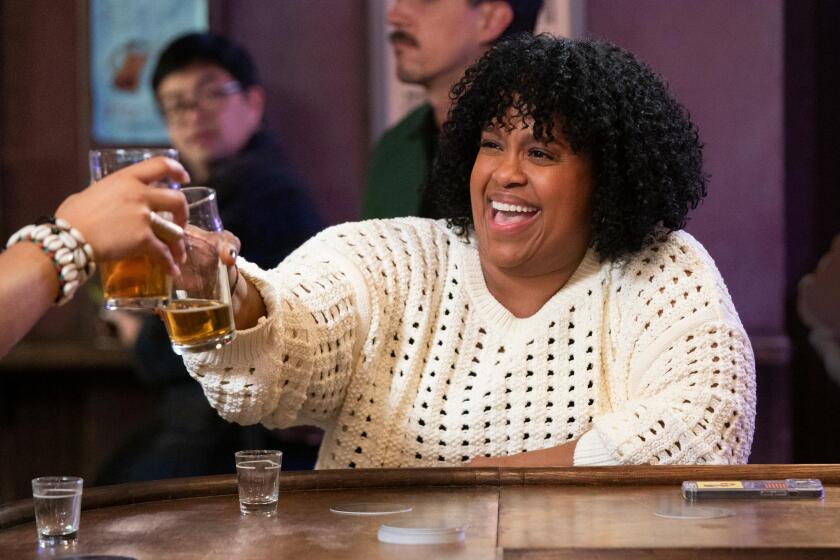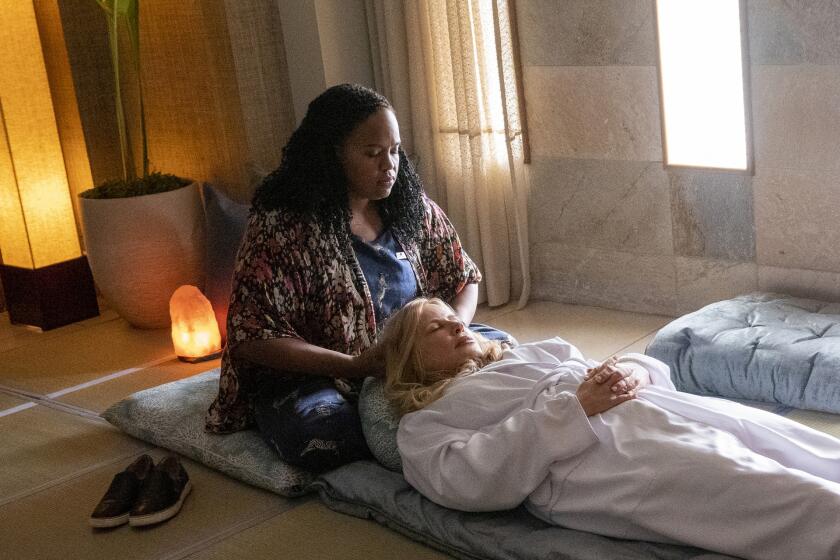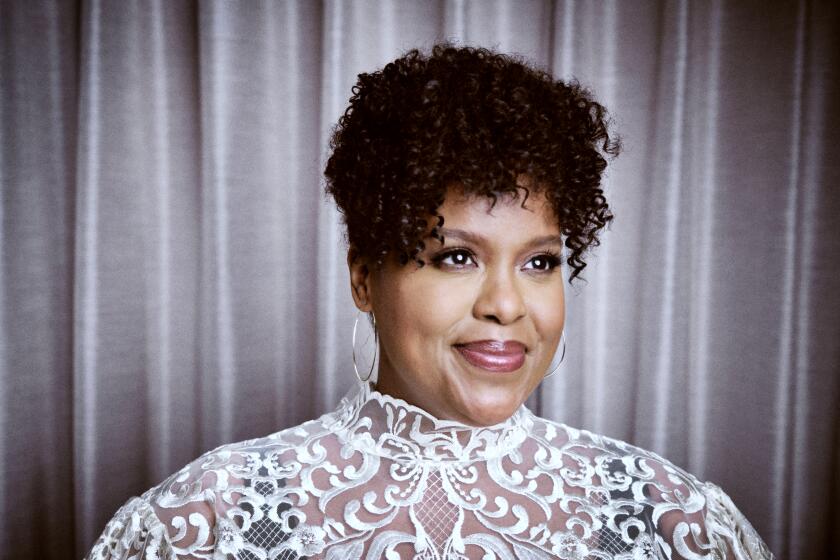
- Share via
“Follow the fear” is a phrase that Natasha Rothwell says has been imprinted on her brain since her days in improv. So when a TV executive asked, “If you had a TV show, what would you want it to be?” she thought about the thing that scared her the most at the time: dying alone.
That was roughly around the time her star was rising with “Insecure,” where she pulled double duty, writing and playing the show’s GIF-able BFF Kelli. She had a development deal at HBO when the existential pressure points of her professional and personal lives became linked.
“I definitely entered this project title first; I was just like, “OK, ‘How to Die Alone,’” she said over a video call. “I want to write a show that explores how to do that if you’re not going to be partnered in this lifetime because [those were] the cards you drew.”
Things fell into place when she had some dental work done and was in pain. She took ibuprofen, had “a huge allergic reaction” and had to drive herself to urgent care.
“I was confronted with the title of the show in real time,” she said. “What is this telling me? And what it was telling me was that while I wasn’t literally alone — I was with a bunch of people that are in urgent care at midnight on a Friday night — but I was very lonely.”
Creator-star Natasha Rothwell and a genial cast lift spirits in new Hulu series ‘How to Die Alone’
Like many of life’s existential moments, this one brought reflection, and ultimately birthed “How to Die Alone,” her new series now streaming on Hulu that’s now part of her overall deal with ABC Signature, which produced the comedy series for Onyx Collective. In it, Rothwell plays Mel, a 30-something single woman who works at a New York airport and is complacent living life passively. But after a brush with death — a bookshelf she’s assembling topples on her — she’s inspired to take more action. In addition to creating and starring in the series, Rothwell is co-showrunner alongside Vera Santamaria (“Pen15”).
It arrives as Rothwell’s career continues to thrive in abundance, as her “Insecure” character might say. Since wrapping the HBO series, she’s earned an Emmy nomination for her role as spa manager Belinda in the first season of HBO’s “The White Lotus,” and hit the big screen with “Wonka” and the Disney animated movie “Wish.” And there’s more to come. Last week, it was reported that Rothwell is developing a series based on the viral TikTok series “Who TF Did I Marry?” by Tareasa “Reesa Teesa” Johnson. “I was instantly hooked,” said Rothwell about the videos in a separate email conversation. “Tareasa is a gifted storyteller who has given the world a lesson in vulnerability and I’m excited to help bring her story to life.”
Rothwell discussed the challenges of getting a show that isn’t based on preexisting intellectual property — or IP — to the screen, the scene pulled from her life, and why “White Lotus” creator Mike White is someone she’d follow anywhere.
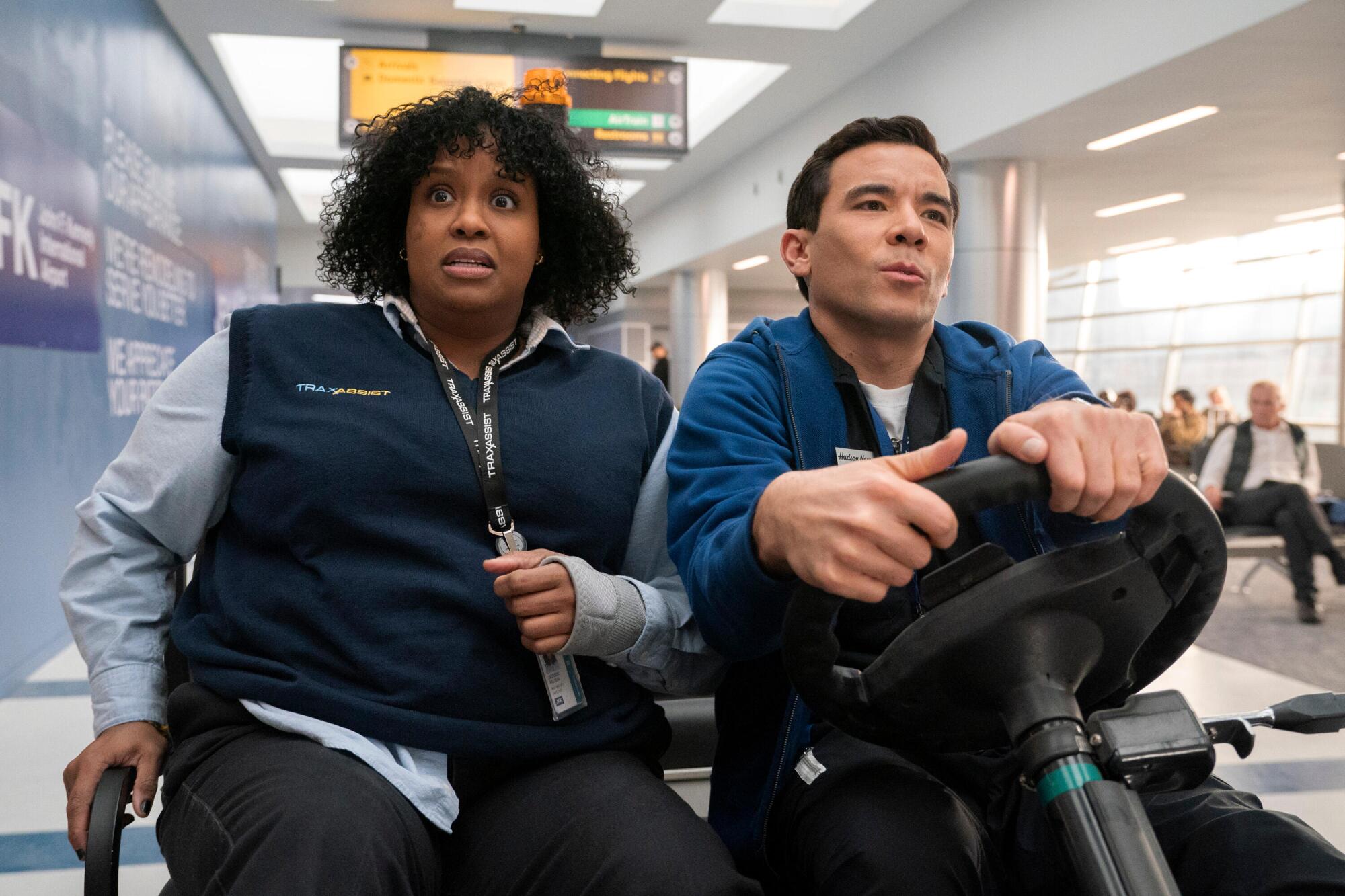
This idea to unpack being alone versus loneliness began percolating for you years ago, at a different stage in your life. How has the time since shaped your perspective? How much of that was your own internal fears versus societal pressure?
Definitely the latter rather than the former. There should be a TED talk on it because I consumed media from a young age — romcoms, Disney — and it was just “find the guy, that’ll fix your problems; have the kids, that’ll fix your life.” And there was nothing that was sold to me as as a viable path that looks like the one I have. I don’t want kids. I love them for other people; I love my niece and nephew. But I have zero desire to have children. I want romantic partnership, but I’m not going to settle just to get one.
At the time that I got this pilot deal, I had been in therapy — at the time it was 15 years. I had done a lot of work in order to get into the show and crack that for me. But it’s so funny that after all of that therapy, I was still wrestling with just the word “alone.” And then it wasn’t until that moment in urgent care I was able to parse out the words and be like, “I was saying the wrong thing. I’m not afraid to die alone. I’m terrified of dying lonely.” For me, the pressure from society to have your life look a certain way is exacerbated by your womanness, by your brownness. It’s a very, very heavy, heavy burden to live up to other’s expectations.
What excites me about this show is the ability for our protagonist to confront that, and when she has this wake-up call, she realizes the call was coming from inside the house. Her ability to decide for herself, “What do I want?” It’s so empowering. There are all of these things that are telling us to to look outward for that wholeness when I think it should be inward.
In the background of a romantic dinner scene on a boat, the two actors reveal they improvised a conversation about “our horrible history with men. I think there was an STD running joke we did.”
The first episode features many moments familiar to the single person — being ditched by friends for hookups and assembling IKEA furniture on your own. What scene was pulled from your life?
The IKEA furniture. I had a s— day, I went to IKEA, as I often do, to have a hot dog for $1.50 and some Swedish f— meatballs in some weird lingonberry sauce with some mac and cheese that makes you run to the bathroom the moment you get home. That was my night. I walked around that IKEA, and I saw a wardrobe. I was like, “I have a studio apartment in Brooklyn, my closet is small, I want to get this wardrobe.” The wardrobe was twice my size. I put it on the little flatbed, and I was realizing, “How am I going to get this home?” It’s not going to fit a cab. I’m going to have to take the bus, which I did.
The bus driver was just like, “What are you doing?” And I was just like, “I’m stuck here without a ride. I need to get home.” He was like, “all right.” He came down, he helped me bring it onto the bus, and then the scene with Mel dragging the boxes up her stairs — that was me. Got it, put it together. And while I was putting it together, a shelf at the very top slid down and hit me right in my head. I didn’t, of course, die or even black out. I just had a welt on my head that looked like I saluted too hard. In the instructions, they said, “You need someone [to help].” I was like, “No, you don’t.” I got it up and I used it, and I took such pride every time I saw it.
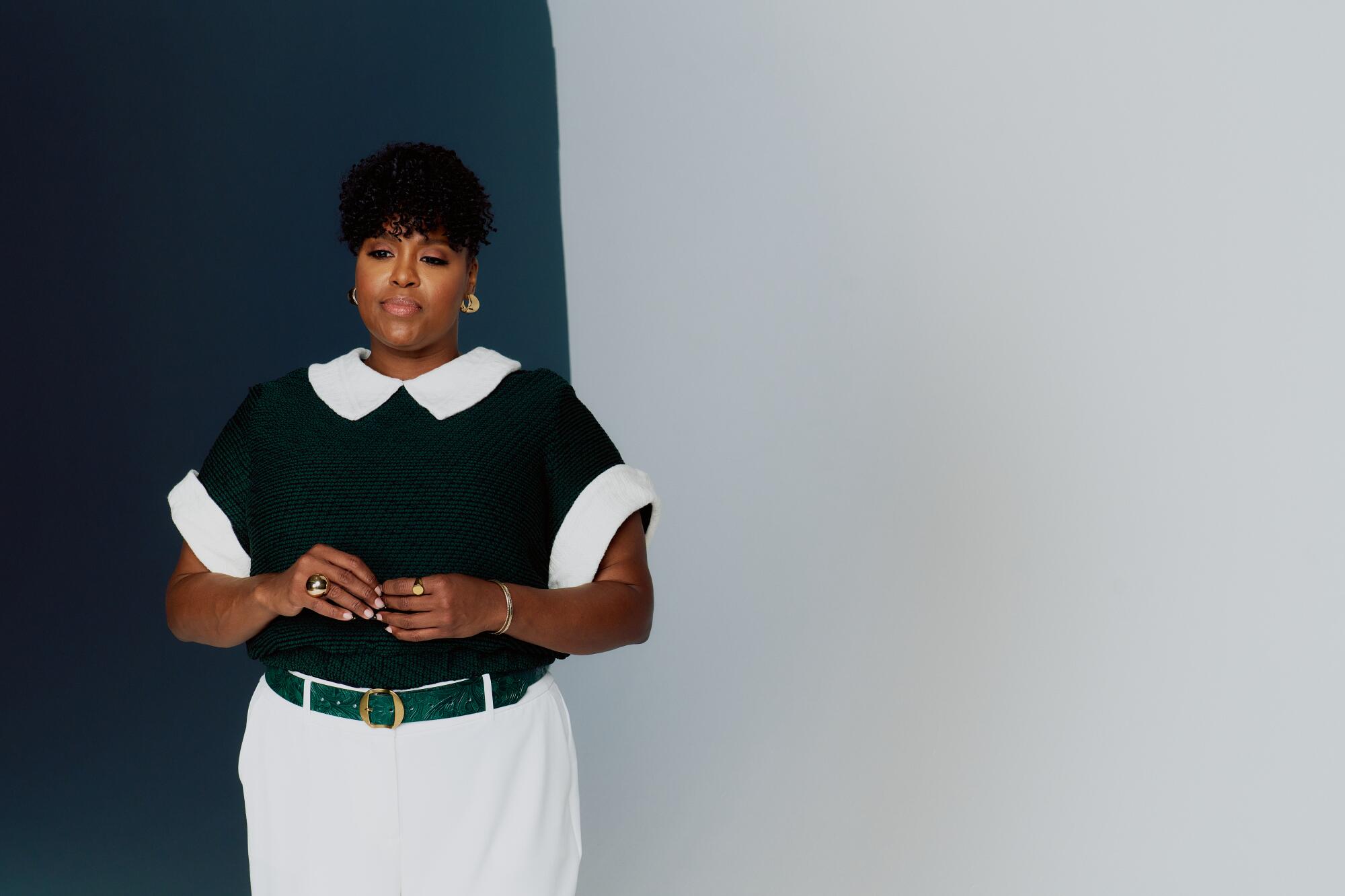
We’re in a period of serious belt tightening in the industry. Are you surprised your show made it to screen? What is it like pitching a show not based on a preexisting IP?
It took me seven years to make this show because it was original IP. I do think that being a content creator and being a person of color in this industry, it is difficult. It just is. It’s unfortunate. The proving I had to do that I feel like my white counterparts don’t necessarily have to do, to be like, “I promise you, this is going to be good” — it’s exhausting. I think that, in a post-strike world, when so many of these studios have purged their DEI [Diversity, Equity and Inclusion] executives, and the representation at those levels is dwindling, it is a wonder that the show was able to be made. That’s why I fight so hard, and why I fought so hard, to have representation on set — having the department heads and the cast and the crew to walk the walk, to cash the check that I write with my mouth and my activism.
I don’t want to posit what the solution is because I think we have to ask those executives why they are continuing to perpetuate that aspect of the industry. I can only do what I can do. You bet your ass I’m going to make sure that every director for my season was a woman of color. We had a 50/50, hetero-normative binary split, gender-wise, on set for department heads, for crew. I wanted to make sure that I do what’s in my control. My hope is that in this show’s success, executives and studios recognize the value and the bankability of diverse ideas and diverse shows, and understand that ... there is value in original storytelling, but it does take risk. And that risk is worthwhile.
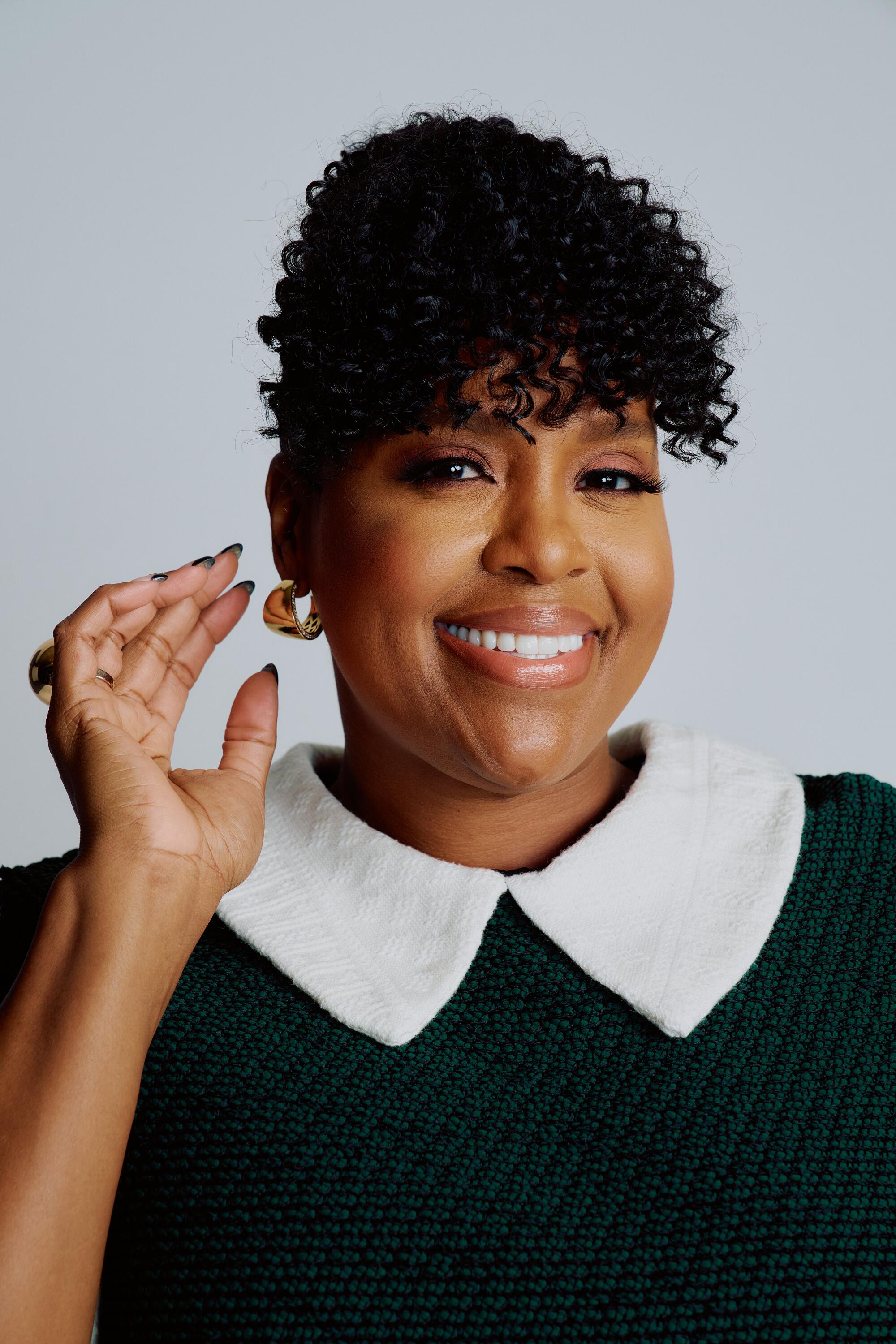
What does it mean to you to be the lead of a TV series, and how is that different than what it means to be the creator of a series that has made it to air?
Being the creator of a series that made it to air is something that has been a goal of mine for a long time. I really do love it in a sick way because it’s hard, backbreaking work to do — showrunning and executive producing and fighting for every story and all of that. To be leading the show on camera is a shift. Stepping into that spotlight has changed me fundamentally in the best ways. I think some of the residue of the work that I’m doing in therapy is worthiness and belonging. It’s funny how this moment is bringing up those little dregs of work that I still need to do in that area. But it’s been healing to be in this position and to feel seen and to have people embrace this work and to embrace me. I do feel very connected to Mel in that way, where the show is not by any stretch of the imagination a near death experience, but it is the death of a lack of self-confidence.
The multi-hyphenate calls her directorial debut for the HBO series ‘a call to arms for authenticity.’ But getting there took a lot of growth.
You’re returning for the new season of “White Lotus” and you’ll be reprising your role as Belinda. This season features Carrie Coon, Walton Goggins and Parker Posey. Please tell me everything about that cast dinner on night one.
I’m obsessed with the cast of this season. Every person you named was nominated for an Emmy this season. Walking into that space, I was so nervous. I have social anxiety, and the way that expresses itself is, I don’t really go up to people and fangirl. Sometimes I think that comes across as I’m too cool for school, but it’s like, “No, I’m sweating. And I’m sitting in a pool of my own sweat.”
It wasn’t until after dinner that I actually spoke. One of the first things Carrie said to me — well, first of all, I had diarrhea of the mouth, I was like, “I’m obsessed. I love you. You’re just so good. You’re excellent. I was just so nervous to come over.” She’s like, “No, I was nervous to come over to you. Season 1!” I found out, cast member by cast member, they were like, “Oh, that’s Belinda. She’s OG.” I was like, “Oh, that’s my currency in this circle.” I lived through Season 1. I got Emmy nominated for it. So, I sat up a little bit taller and hung out with everyone. It was just the best.
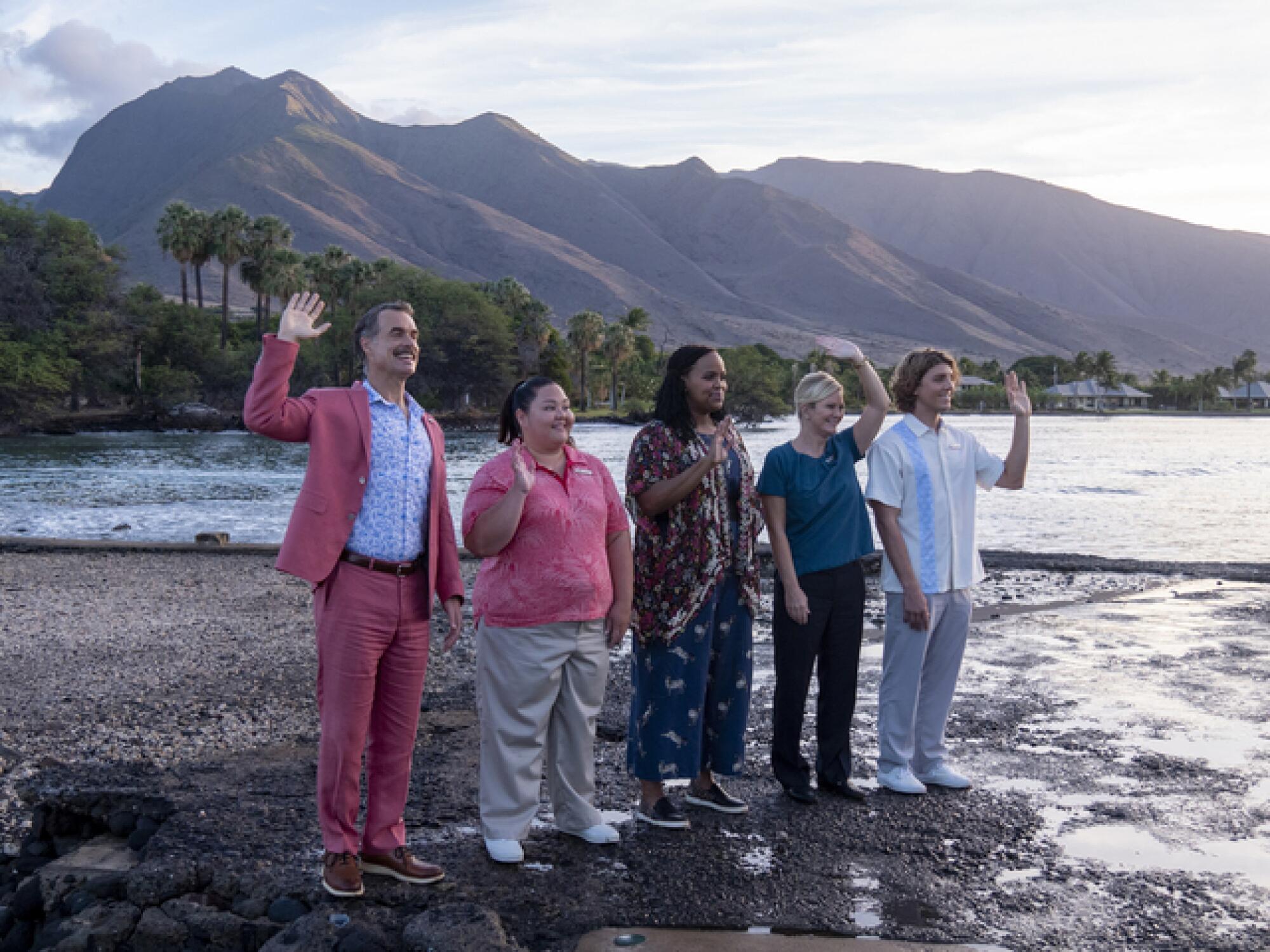
Where were you when you learned Tanya McQuoid (Jennifer Coolidge’s character who was connected to Belinda’s storyline in Season 1) died?
I was in my living room with my dog. I was watching along with everyone else, because I’m a fan of the show. I don’t know anything in advance. I saw her running on the boats with the guns, and I was like, “Yes, baddie with bullets. Let’s go! She’s dodging, she’s going!” When she slipped, I gasped. I remember texting [creator Mike White], “I am so shook right now.” What I thought about more than anything was Season 1, when we were on the boat. Jennifer famously gets sick; she has the worst seasickness that I’ve ever witnessed from anyone. They had a bucket that was bedazzled with her name on the boat, so the fact that she was on a boat so much Season 2 and then died off a boat, I was like, “Mike, you’re so cruel. So cruel!” He was like, “I need it for story.”
What are your conversations like with Mike White? I know you felt comfortable pitching jokes or moments with him in Season 1, and he really valued the way you read and shared your thoughts on scripts. How was that collaboration as you returned to the series?
It picked up where we left off. He was like, “When can we get on Zoom and talk through everything?” I made page notes and we talked through character pitches and story pitches. He was so receptive. And I got pages where he addressed those notes. It’s such a wonderful back and forth. He truly sees [me] like, “Oh, this is a peer; you’re a fellow writer.” It was wonderful to be seen that way and have my skill set and my hyphenates acknowledged and not having to compartmentalize because he sees me as a creator, much like he’s a creator. I have such deference for him, and I’ve been a fan of him for so long. There’s a real trust there because we became family in Season 1, and so I ride for him heavy.
More to Read
The complete guide to home viewing
Get Screen Gab for everything about the TV shows and streaming movies everyone’s talking about.
You may occasionally receive promotional content from the Los Angeles Times.
